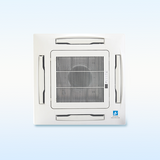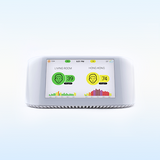Best Air Purifier in India for Asthma Patients
Atlanta Healthcare Air Purifier is the best air purifier for patients with Asthma or Respiratory disease. It’s iCluster technology helps remove dust, pollens, bacteria, viruses, pet dander, smoke, bad odour, VOCs, mildew, gases, PM 2.5 & CO2, so you can see, every allergen or pollutant is taken care, which can trigger an asthmatic attack.Breathe Easy with an Air Purifier: How it Helps Asthma Patients & Patients with Respiratory Disease
Are you tired of constantly struggling to catch your breath? Do you suffer from asthma or respiratory issues that make it difficult for you to breathe easily?
If so, an air purifier may be just the solution you need. Not only does it filter out harmful pollutants and allergens in the air, but it can also provide relief for those with breathing difficulties.
In this blog post, we'll explore how an air purifier can help asthma and respiratory patients live healthier and more comfortable life. So sit back, take a deep breath, and let's dive in!
Introduction to Air Purifiers
An air purifier is a device that removes contaminants from the air in a room. These devices are commonly used to improve indoor air quality.
Air purifiers can be used to remove dust, pollen, mold spores, and other allergens from the air. Additionally, many air purifiers also remove smoke, chemicals, and other particles that can cause respiratory problems.
Air purifiers vary in their design and features. Some units are small enough to fit on a desk or table, while others are large enough to purify the air in an entire room. There are also whole-house air purifiers that can be installed as part of your home’s HVAC system.
When shopping for an air purifier, it’s important to consider the specific needs of your home or office space.
For example:
- If you have asthma or another respiratory condition, you’ll want an air purifier that is specifically designed to remove allergens and other particles that can trigger an attack.
- Additionally, if you live in an area with high levels of pollution or smog, you may want an air purifier that has a HEPA filter to remove these particles from the air.
No matter what your specific needs may be, there is an air purifier out there that can help you breathe easier and enjoy better indoor air quality.
Benefits of using an air purifier for asthma patients & people with respiratory diseases
If you or someone you know suffers from asthma or another respiratory disease, you may be looking for ways to ease the symptoms.
Asthma and other respiratory diseases can be triggered by a number of things, including dust, pollen, smoke, and pet dander.
An air purifier can help to remove these triggers from the air, making it easier to breathe.
There are a number of benefits to using an air purifier for asthma patients and people with respiratory diseases.
Air purifiers can help to:
- Remove triggers from the air, such as dust, pollen, smoke, and pet dander
- Reduce symptoms of asthma and other respiratory diseases
- Improve indoor air quality
- Provide relief from allergy symptoms
If you suffer from asthma or another respiratory disease, an air purifier may be able to help you breathe easier. Talk to your doctor about whether an air purifier is right for you.
Types of air purifiers
When it comes to air purifiers, there are many different types and technologies on the market.
So, how do you choose the right one for your needs? Here is a breakdown of the different types of air purifiers available to help you make an informed decision:
- HEPA Air Purifier: This type of air purifier uses a High-Efficiency Particulate Air (HEPA) filter to remove 99.97% of airborne particles as small as 0.3 microns from the air. This makes them ideal for people with asthma or other respiratory conditions that can be triggered by airborne allergens or pollutants.
- Activated Carbon Air Purifier: This type of air purifier uses activated carbon to adsorb odors, chemicals, and smoke from the air. This makes them ideal for people who are sensitive to environmental pollutants or who live in areas with high levels of smog or pollution.
- Ozone Generator: This type of air purifier produces ozone, which is a powerful oxidizing agent that can destroy bacteria, viruses, and mold spores in the air. However, ozone generators should be used with caution as they can also be harmful to human health if used improperly.
- Ultraviolet Germicidal Irradiation (UVGI) Air Purifier: This type of air purifier uses ultraviolet light to kill bacteria, viruses, and mold spores in the air. UVGI air purifiers are safe for human health but can
How to choose the right air purifier?
When it comes to choosing an air purifier, there are a few things you need to take into consideration.
- The first is the size of the unit. You want to make sure that the unit you choose is powerful enough to purify the air in the room you plan on using it in.
- The second thing you need to consider is the type of filter the unit uses. The most common types of filters are HEPA filters and activated carbon filters. HEPA filters are great for removing dust, pollen, and other allergens from the air, while activated carbon filters are more effective at trapping smoke particles and odors.
If you or someone in your family suffers from asthma or another respiratory condition, then choosing an air purifier with a HEPA filter is a must.
A good quality HEPA filter can remove up to 99.97% of airborne particles, making it an essential tool for managing asthma and other respiratory conditions.
Activated carbon filters can also be helpful in reducing smoke and odor particles in the air, making them a good choice for homes with smokers or pets.
Tips for Maintaining an Air Purifier
When it comes to asthma and respiratory patients, an air purifier can be a useful tool in helping to manage symptoms.
Here are some tips for maintaining an air purifier:
- Keep the filter clean - over time, the filter in your air purifier can become clogged with dust and other particles. This can reduce the effectiveness of the purifier, so it's important to keep the filter clean. You can usually do this by simply vacuuming it or tapping it gently to remove any buildup.
- Change the filter regularly - depending on the type of air purifier you have, the filter may need to be changed every few months. Check your owner's manual for more specific information.
- Don't forget about other filters - in addition to the main filter in your air purifier, there may also be filters in the ductwork or vents leading to and from the unit. These should be checked and replaced as needed to ensure that they're not adding contaminants back into the air.
- Keep the unit clean - just like any other appliance in your home, an air purifier needs to be kept clean in order to work properly. Wipe down the exterior of the unit regularly with a damp cloth, and vacuum around it if possible (being careful not to damage any cords or connections).
- Follow manufacturer's instructions - each air purifier is different, so be sure to read through your owner's manual thoroughly before
Alternatives to an Air Purifier
If an air purifier is not an option for you, there are other ways to improve the quality of the air in your home.
These include:
- Vacuuming regularly with a HEPA filter vacuum
- Dusting with a damp cloth
- Avoiding the use of chemical cleaners
- Keeping indoor plants
- Opening windows to let fresh air in
Conclusion
An air purifier is a great way to help those with asthma and other respiratory issues breathe easier. By helping to reduce airborne irritants, it can improve the quality of air in your home.
In addition, an air purifier can also be beneficial for those who suffer from allergies or seasonal allergies as well by reducing pollen or dust particles that could trigger a reaction.
With so many different options available, you are sure to find one that fits your needs and budget while providing clean and healthy air.




















